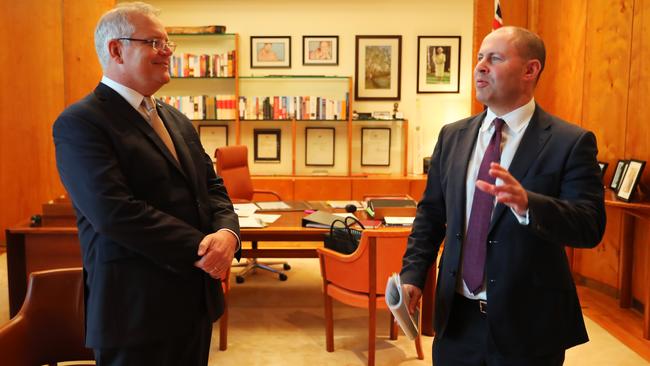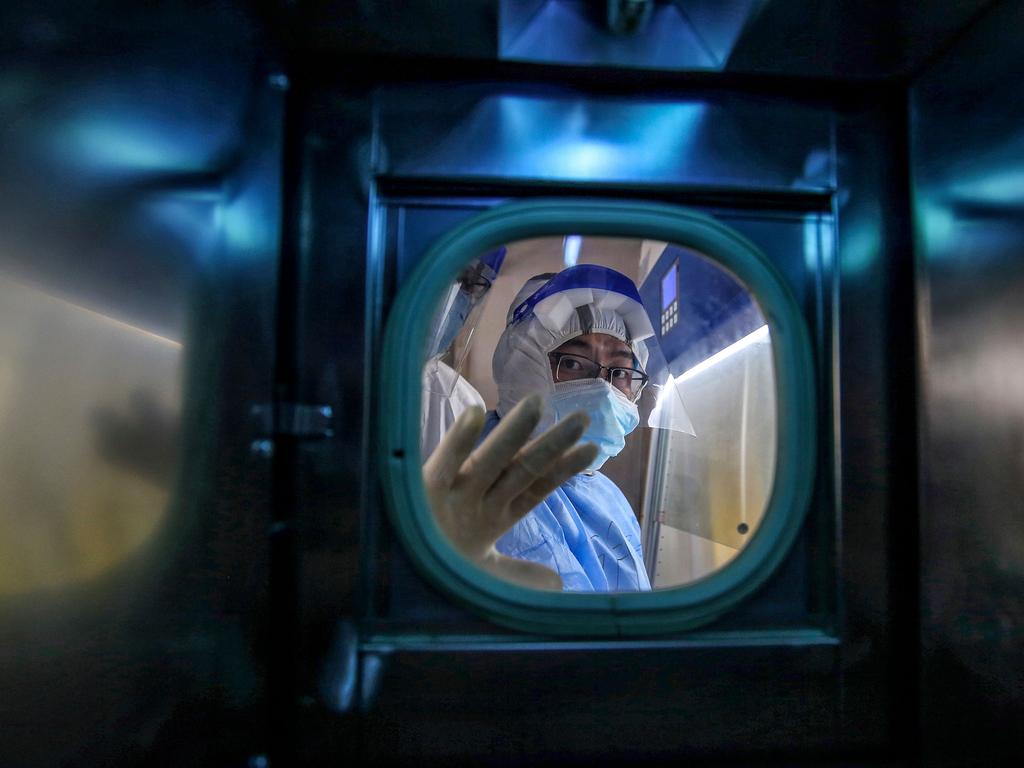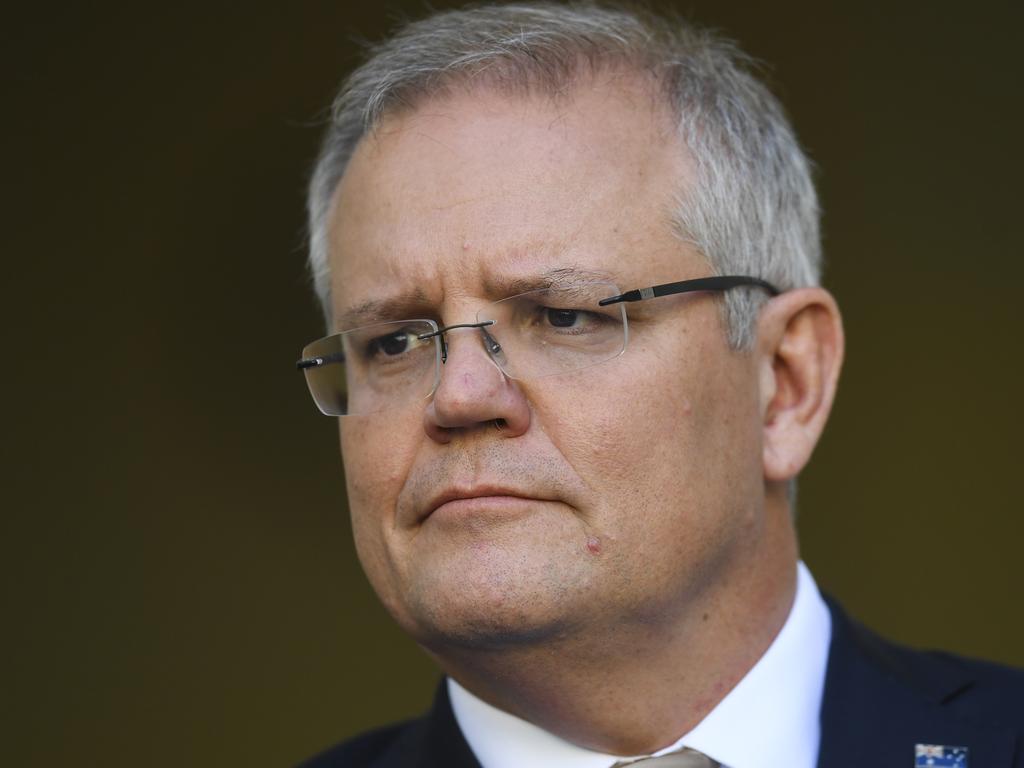Coronavirus: Virus exposes weak global leadership
Australia is hostage to two unknowns — the expansion of the coronavirus and the now exposed inadequate nature of global leadership.

Scott Morrison and Josh Frydenberg crossed a threshold with their fiscal package — it constitutes a transformation in Liberal Party economic thinking. Its hallmarks are pragmatism under pressure, dispensing with ideology, being guided by the federal Treasury and learning from the success and failures of the previous Rudd packages during the global financial crisis.
The package punts nearly $11bn into the economy before June 30, with Treasury estimating this will boost GDP growth that quarter by 1.5 per cent. This would normally be enough to deny a recession in most downturns. But the normal has ceased to exist.
The world confronts in COVID-19 an insidious, lethal and panic-inducing enemy that, so far, is eroding the foundations of the global order and placing unprecedented strains on national health systems.
Professor Warwick McKibbin, a leading economist and pandemic analyst, tells Inquirer: “There is no global leadership. It’s just chaotic. The United States has abandoned its role as global economic co-ordinator. The Australian government is doing the best it can and the scale of its response is strong compared with other countries. But this is a health crisis. While the economic package this week will have an impact, it is not going to avoid a substantial dislocation in the Australian economy.”
This captures the dilemma. The cancellation of the Sydney Royal Easter Show is a turning point. More cancellations will follow. It has already begun with sporting events. The Prime Minister moved to upgrade Australia’s health protections on Friday — a ban will apply to non-essential organised mass gatherings of 500 and more and a national cabinet of federal and state leaders will be established to better unify the response to the coronavirus.
The Australian sharemarket closed down 11 per cent for the week, one of the worst in history, after a volatile Friday. After the fiscal package, the Treasurer raised the pivotal question: “The unknown is: how does the virus evolve from here?”
Australia is hostage to two unknowns — the expansion of the virus with its ability to shut down societies, and the now exposed inadequate nature of global leadership. Trump’s “America First” mentality and selfish mercantilism is now a threat to America, to the world and to Australia.

Markets took heart from news that US house Speaker Nancy Pelosi and the Trump administration are about to finalise agreement on measures to help Americans combat the coronavirus — but final judgment awaits the details of the size and scope of the deal.
The US President’s failure to this point has been alarming. His Oval Office address to calm markets and the public was a monumental failure. Having boasted about the sharemarket, he now presides over one of the greatest market routs in history. He has failed to provide economic leadership but nobody should be surprised because the entire Trump presidency was premised on a repudiation of the US global leadership role since World War II.
At some point, this would finish in a burning platform and, unless Trump reverses course, that day may have arrived. Trump’s character as a shallow cheerleader is exposed when his task is leadership in a global emergency and national crisis.
The US Federal Reserve is planning to pump loads of liquidity into the system but its own messages have been inadequate and the tension between Trump and the central bank completely unproductive. The US congress has been bickering over measures that seemed grossly inadequate in fiscal terms — but we shall see.
Despite our endlessly discussed flaws, Australia’s decision-making system looks a model of rationality compared with the US shambles.
Analysis by Deloitte Access Economics at the week’s end calculated the Morrison government stimulus equivalent to $916 for every man, woman and child, compared with Italy’s stimulus at $720 per person — despite being in a far deeper predicament — with the US congress negotiating over an inadequate $234-per-person effort Trump proposed.
Economist and Deloitte Access Economic partner Chris Richardson tells Inquirer: “Our budget is still healthy compared with other countries and we have the prospect of this package getting through with bipartisan support.
“The package is guided by pragmatism, not ideology. The government has done a good job and listened to the Treasury. In terms of the economic impact, I still don’t think this will be as bad as the global financial crisis.
“We modelled the government’s package and found a GDP impact very similar to that of the government. The Treasury estimated the package would deliver extra support in the June quarter of 1.5 per cent of GDP and our matching figure was 1.4 per cent.
“The government has fired a bazooka at the problem. It has worked hard to protect jobs with a wide scatter of fast money to business, with a fair amount going to poorer people, who are likely to spend it.”
But Richardson says there are “no guarantees” because “the war, in many ways, will be won or lost on the health side”. And that war, along with the critical economic response, is global. “The American response under President Trump is hopeless,” Richardson says. “The big question was always: how would President Trump fare in a crisis? What we now face is a global leadership vacuum.”
Richardson says the Americans are fighting “with one hand tied behind their back” because of their budget deficit. The Congressional Budget Office estimates it will reach US$1 trillion ($1.56 trillion) this year. It has increased nearly 50 per cent in the Trump era and is equivalent to about 4.5 per cent of GDP, thereby posing a serious impediment to a US fiscal response to the crisis.
The Wall Street Journal lamented this week in its editorial: “When President Trump sees a political threat, his instinct is to deny, double down and hit back. That has often been politically effective, but in the case of the novel coronavirus it has undermined his ability to lead. His public remarks too often continue to give the impression that he views the virus more as another chance for political combat than as a serious public health problem.”
Community transmission in Australia remains at a low level. But this is certain to change. Morrison continues to appeal for calm as the necessary disruption mounts. News that Home Affairs Minister Peter Dutton has tested positive for the virus suggests it may penetrate the cabinet. Any sign of the cabinet succumbing will only intensify the sense of dislocation and health crisis.
The government has been singularly remiss in not rolling out a public information campaign far earlier. This has been a constant community complaint. A welcome feature of the week, however, has been evidence of political bipartisanship with Labor leader Anthony Albanese indicating his party is likely to give passage to the fiscal measures. A national cabinet can only function on a bipartisan basis, a test for all leaders.
More than any other decision, this week’s package offers a defining insight into the Morrison government. It has put pragmatism before ideology. It has defined itself by action. Morrison’s performance has been the opposite of his ineptitude during the bushfires.
Having been reluctant to move decisively on the economy, it has let the crisis purge that reluctance. Having begun by referring to “modest” measures, Morrison and Frydenberg finally threw the kitchen sink at the problem, a correct reversal of earlier timidity. The role of Treasury under secretary Steven Kennedy has been impressive, and there was a collective ability to draw upon the experience of 12 years ago when the previous Labor government responded to the GFC.
None of this means the package will necessarily succeed. It is hard to fight a virus with fiscal policy. “If more is required, more will be done,” Morrison said after the package. He keeps saying the package is scalable — if the economy gets worse, the government will do more. The second opportunity will be the budget in eight weeks. Morrison and Frydenberg, of course, are loath to turn the budget into another major stimulus event. But that depends on events beyond their control. The omens this week are bleak and a bearish global economy may force the government’s hand.
The package involves a spend of $17.6bn spread over the four years of the forward estimates representing 0.9 per cent of GDP. But it is front-end loaded in the next three months and in the year to June 30, 2021. From the start, Morrison had the firm view that this is a finite event — a health crisis that will peak, decline and disappear — not a bank and financial crisis whose consequences will linger for a decade. He says the economy can bounce back (the unspoken message being even from a recession). This is probably true, but the unknown factor is the time it takes for the virus to run down.
The key to the package was the decision taken by Morrison, Frydenberg and Finance Minister Mathias Cormann over Sunday dinner at the Lodge on March 1, when they went a fair way to sort out the principles that would govern their response. Pivotal to the design of the package was the finalisation of these principles that have allowed the government to radically change economic policy but retain its underlying economic values. Hence the package, above all, has been temporary and targeted.
Frydenberg tells Inquirer: “This is different to the Rudd stimulus packages in three respects. First, we are using the existing mechanisms, the tax and transfer system, not creating new programs like school halls and pink batts. Second, our package is geared to protecting jobs and supporting business as the priority with $3 out of every $4 spent on business support. And third, our support for households is very targeted, unlike the second Rudd stimulus.”
Going to the wider picture, Frydenberg says: “This situation is unlike the GFC in two other respects. We face a position now where monetary policy had been nearly exhausted and where China has been the original location of the problem.”
The structure of the package is crucial. The first priority is supporting business to sustain cash flows to keep people in jobs. The second priority is cash to households. In the immediate period to June 30 this year, the cash boost for business is worth $5.9bn and the one-off $750 payment to social security and income support recipients, with pensioners the main beneficiaries, totals $4.8bn.
This package’s temporary nature keeps alive Morrison’s hope of saving the structural integrity of the budget and getting back to surplus before the next election — a daunting task that will be made impossible if the downturn intensifies.
The big risk for Australia is that world leaders cannot co-ordinate a resolute health and economic response. Major economies are more vulnerable than in 2008-09 for two reasons: they are saddled with more fiscal deficits and debts, thereby being limited in their fiscal response, and central banks have all but exhausted their conventional instruments, given record low or negative interest rates. The virus has fallen upon a gravely weakened world.








The failure of global leadership revealed starkly by US President Donald Trump but not confined to him now sees a COVID-19 contagion threatening lives, jobs, markets and economies across the globe — the risk being that it will overwhelm the ambitious Morrison government effort this week to avert recession.